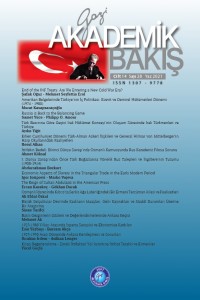Abstract
Bu araştırma temelde Arap Baharı sonrası Suriye ve Libya’da Rusya’nın yürüttüğü dengeleme oyununu göstermeyi amaçlamaktadır. Son zamanlarda Rusya bölgesel ve lokal aktörlerle ittifak ilişkileri kurarak Suriye ve Libya’daki nufuzunu arttırmıştır.Böylece başta ABD olmak üzere rakiplerini dengelemeye ve gücünü konsolide
etmeye çalışmıştır. Arap Baharı sonrasında, Rusya ABD’nin tek başına bölgeyi domine etmesini engellemek ve geleneksel müttefiki Beşar Esed rejimini korumak adına askeri gücünü Suriye’ye gönderdi. Rusya çabalarıyla ABD’yi dengelemeyi ve Esed rejiminin hayatta kalmasını sağlamayı başardı. Daha sonra Libya’da nufuz alanını genişletmek ve rakiplerini dengelemek istedi. Esasen kendi imkanlarının yanısıra Mısır, Birleşik Arab Emirlikleri ve Halife Haftar grubuyla kurduğu itttifak ilişkilerini kullandı. Rusya’nın Libya’da artan varlığı kaçınılmaz olarak devletlerarası güç dengesini ve bölgesel rekabeti etkilemiştir. Ancak, parçalanmış olan ülkede dış güçlerin desteklediği milisler arasındaki çatışmalar kızışmıştır. Sonunda Birleşmiş Milletlerin tanıdığı Libya Ulusal Mutabakat Hükümeti (LUMH), Halife Haftar grubu karşısında güçünü konsolide etmiş ve kuzeybatı Libya’nın kontrolünü ele almışsa da istikrarsız ortam hala ülkede hüküm sürmektedir.
Keywords
References
- AMBROSIA, Thomas, “The Russo-American Dispute over Invasion of Iraq: International Status and the Role of Positional Goods”, Europe-Asia Studies, Vol. 57, No. 8, December 2005, 1189-1210.
- AMOUR, Philipp O., “Introduction: The Regional Order in the Gulf Region and the Middle East.”, Philipp O. Amour (Ed.), The Regional Order in the Gulf Region and the Middle East. Regional Rivalries and Security Alliances, 1–25, Palgrave MacMillan, 2020. https://doi.org/10.1007/978-3-030-45465-4_1.
- AMOUR, Philipp O., “Israel, the Arab Spring, and the unfolding regional order in the Middle East: a strategic assessment”, British Journal of Middle Eastern Studies, 44:3, 2017, 293-309.
- AMOUR, Philipp O., (Ed.) The Middle East Reloaded: Revolutionary Changes, Power Dynamics, and Regional Rivalries since the Arab Spring, St. James’s Studies in World Affairs, Academica Press, Washington, DC 2018.
- AMOUR, Philipp O., The Regional Order in the Gulf Region and the Middle East. Regional Rivalries and Security Alliances, Palgrave MacMillan, USA 2020. https://doi.org/10.1007/978-3-030-45465-4.
- AMOUR, Philipp O., “Regional Rivalries and Security Alliances in the Gulf Region and the Middle East.”, Philipp O. Amour (Ed.), The Regional Order in the Gulf Region and the Middle East. Regional Rivalries and Security Alliances, USA 2020. https://doi.org/10.1007/978-3-030-45465-4_14.
Abstract
This research mainly aims to show the balancing game of Russia in Syria and Libya after the Arab Spring. Recently Russia has increased its influence in Syria and Libya by its own capabilities and alliances with regional and local actors. Thus, it sought to consolidate its strength and balance its rivals, predominantly the US, in the international system. After the Arab Spring, Russia deployed its military muscle to Syria to protect its traditional ally the Bashar al-Assad regime, and restrain the US from solely dominating the region. Its attempts achieved to ensure the regime’s survival and balance the US in the country. Later, it sought to expand its sphere of influence and balance the rivals in Libya. It primarily used its own capabilities and alliance relations with the Khalifa Haftar group, the UAE, and Egypt. Russia’s growing presence in Libya inevitably affected the regional competition and balance of power among the states. However, the clashes among the militias supported by the external powers escalated in the fragmented country. Eventually, the UN-recognized GNA consolidated its power against the Khalifa Haftar forces and seized the control of northwest Libya, but an unstable environment still prevails in the country.
Keywords
References
- AMBROSIA, Thomas, “The Russo-American Dispute over Invasion of Iraq: International Status and the Role of Positional Goods”, Europe-Asia Studies, Vol. 57, No. 8, December 2005, 1189-1210.
- AMOUR, Philipp O., “Introduction: The Regional Order in the Gulf Region and the Middle East.”, Philipp O. Amour (Ed.), The Regional Order in the Gulf Region and the Middle East. Regional Rivalries and Security Alliances, 1–25, Palgrave MacMillan, 2020. https://doi.org/10.1007/978-3-030-45465-4_1.
- AMOUR, Philipp O., “Israel, the Arab Spring, and the unfolding regional order in the Middle East: a strategic assessment”, British Journal of Middle Eastern Studies, 44:3, 2017, 293-309.
- AMOUR, Philipp O., (Ed.) The Middle East Reloaded: Revolutionary Changes, Power Dynamics, and Regional Rivalries since the Arab Spring, St. James’s Studies in World Affairs, Academica Press, Washington, DC 2018.
- AMOUR, Philipp O., The Regional Order in the Gulf Region and the Middle East. Regional Rivalries and Security Alliances, Palgrave MacMillan, USA 2020. https://doi.org/10.1007/978-3-030-45465-4.
- AMOUR, Philipp O., “Regional Rivalries and Security Alliances in the Gulf Region and the Middle East.”, Philipp O. Amour (Ed.), The Regional Order in the Gulf Region and the Middle East. Regional Rivalries and Security Alliances, USA 2020. https://doi.org/10.1007/978-3-030-45465-4_14.
Details
| Primary Language | English |
|---|---|
| Journal Section | Research Article |
| Authors | |
| Publication Date | June 10, 2021 |
| Published in Issue | Year 2021 Volume: 14 Issue: 28 |

